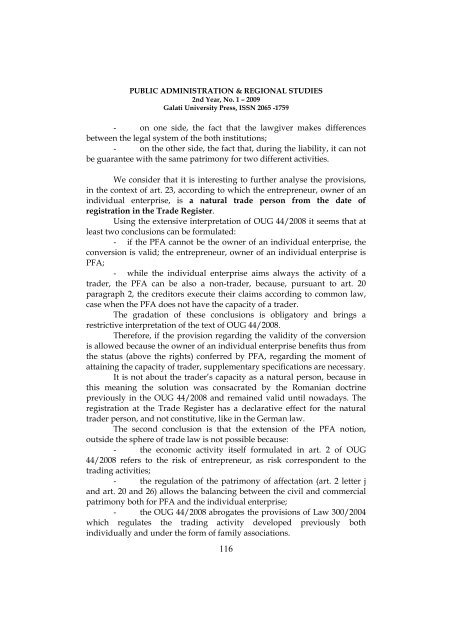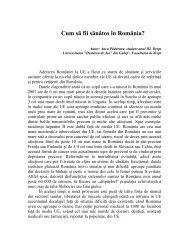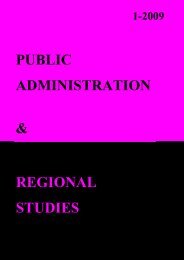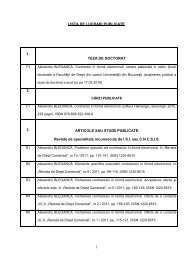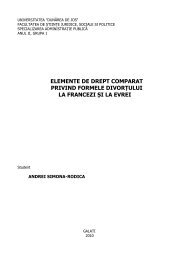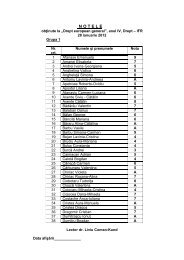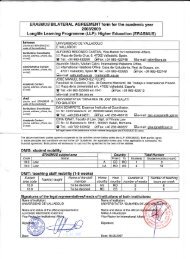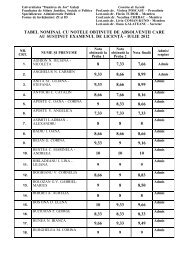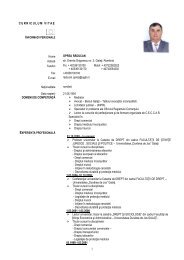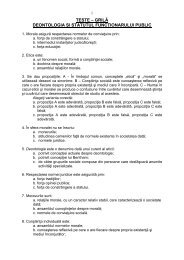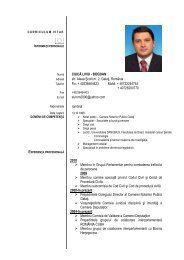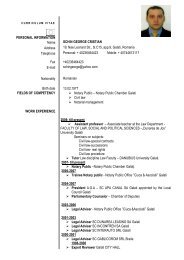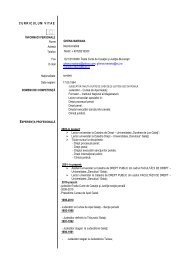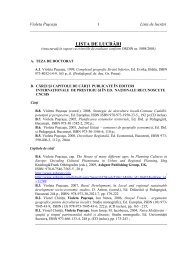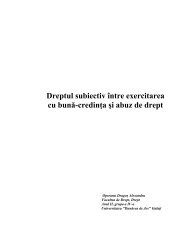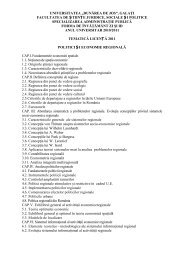regional studies public administration - Facultatea de Drept ...
regional studies public administration - Facultatea de Drept ...
regional studies public administration - Facultatea de Drept ...
You also want an ePaper? Increase the reach of your titles
YUMPU automatically turns print PDFs into web optimized ePapers that Google loves.
PUBLIC ADMINISTRATION & REGIONAL STUDIES<br />
2nd Year, No. 1 – 2009<br />
Galati University Press, ISSN 2065 -1759<br />
- on one si<strong>de</strong>, the fact that the lawgiver makes differences<br />
between the legal system of the both institutions;<br />
- on the other si<strong>de</strong>, the fact that, during the liability, it can not<br />
be guarantee with the same patrimony for two different activities.<br />
We consi<strong>de</strong>r that it is interesting to further analyse the provisions,<br />
in the context of art. 23, according to which the entrepreneur, owner of an<br />
individual enterprise, is a natural tra<strong>de</strong> person from the date of<br />
registration in the Tra<strong>de</strong> Register.<br />
Using the extensive interpretation of OUG 44/2008 it seems that at<br />
least two conclusions can be formulated:<br />
- if the PFA cannot be the owner of an individual enterprise, the<br />
conversion is valid; the entrepreneur, owner of an individual enterprise is<br />
PFA;<br />
- while the individual enterprise aims always the activity of a<br />
tra<strong>de</strong>r, the PFA can be also a non-tra<strong>de</strong>r, because, pursuant to art. 20<br />
paragraph 2, the creditors execute their claims according to common law,<br />
case when the PFA does not have the capacity of a tra<strong>de</strong>r.<br />
The gradation of these conclusions is obligatory and brings a<br />
restrictive interpretation of the text of OUG 44/2008.<br />
Therefore, if the provision regarding the validity of the conversion<br />
is allowed because the owner of an individual enterprise benefits thus from<br />
the status (above the rights) conferred by PFA, regarding the moment of<br />
attaining the capacity of tra<strong>de</strong>r, supplementary specifications are necessary.<br />
It is not about the tra<strong>de</strong>r’s capacity as a natural person, because in<br />
this meaning the solution was consacrated by the Romanian doctrine<br />
previously in the OUG 44/2008 and remained valid until nowadays. The<br />
registration at the Tra<strong>de</strong> Register has a <strong>de</strong>clarative effect for the natural<br />
tra<strong>de</strong>r person, and not constitutive, like in the German law.<br />
The second conclusion is that the extension of the PFA notion,<br />
outsi<strong>de</strong> the sphere of tra<strong>de</strong> law is not possible because:<br />
- the economic activity itself formulated in art. 2 of OUG<br />
44/2008 refers to the risk of entrepreneur, as risk correspon<strong>de</strong>nt to the<br />
trading activities;<br />
- the regulation of the patrimony of affectation (art. 2 letter j<br />
and art. 20 and 26) allows the balancing between the civil and commercial<br />
patrimony both for PFA and the individual enterprise;<br />
- the OUG 44/2008 abrogates the provisions of Law 300/2004<br />
which regulates the trading activity <strong>de</strong>veloped previously both<br />
individually and un<strong>de</strong>r the form of family associations.<br />
116


